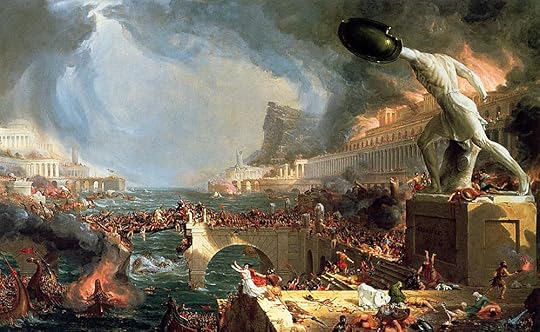Predicting the Coming Dark Age: The Knowledge Apocalypse

Course of Empire, by Thomas Cole
Speculative fiction writers are not feeling too optimistic these days. Both genres have produced numerous post-apocalyptic and dystopian works that have shifted it into a much darker place. There are many different pathways to our destruction. There are zombies, aliens, nuclear weapons, plague, the machines, cyber-attack, new world order fascism, totalitarianism, the antichrist, global warming, and greed. After the cataclysmic apocalypse, many see humanity falling back to a simpler life, more pure to some. For such a future to unfold, it would require the destruction of a vast amount of human knowledge.
Our modern life today is an accumulation of millennia of knowledge contributed by inventors, thinkers, builders, and dreamers. The vast amounts of information are stored in libraries, databases, and within the minds of our best and brightest. An individual living today will never acquire more than perhaps a tenth of percent of all human knowledge. Instead, he relies on the acquired knowledge and skills of other specialized citizens to provide for the needed expertise to sustain a modern lifestyle.
Think of all the things the average citizen doesn’t know. He or she hardly knows how anything works! We don’t know how a cellphone works, let alone how to fix it. We don’t know how to turn coal into electricity, or how to build a car. Some of us can’t even change the oil. Most of us don’t know how our plumbing or electrical systems work in our houses. Most of us can’t perform emergency surgery or diagnose a medical condition in a dying patient. Most of us have no idea how to raise and harvest crops or livestock.
Today’s citizen is so highly specialized and lacks so many basic skills, any kind of catastrophe would leave millions helpless. Novels such as Cyberstorm, World War Z, The Passage, and Earth Abides capture this modern vulnerability. We are so heavily dependent on the knowledge and skills of others, that we are all dangerously interdependent.
A devastating war or cataclysm may not necessarily bring about an age of darkness. There would be a period of upheaval, many would die or fall into poverty, but societies can recover with time. Japan and Europe proved surprisingly resilient after World War 2. Russia restore itself in many ways after the fall of the Soviet Union. Many countries throughout the world have endured calamity but has managed to find their way out of oblivion.
Societies are resilient because the knowledge and skills they rely on can endure calamities.
As mentioned above, all human knowledge is acquired and stored. Any technological breakdown can be repaired as long as the right specialists survive the cataclysm. Even if many of them don’t, the knowledge storage systems may still survive (i.e. libraries, universities, museums, etc.). New specialists can be trained, although there will be a drop off from the previous generation. A true apocalyptic collapse requires the destruction of the knowledge base.
Consider the Library of Alexandria. It was the ultimate storehouse of all accumulated human knowledge in the classical world. When it was destroyed, the loss was irreplaceable. It is believed technological progress froze in its tracks as a result, which later led to a the period known as the Dark Ages. In Rome in particular, there was a clear regression in its civilization.
It is clear the ancient world was more susceptible to a knowledge apocalypse. The Library of Alexandria was one storehouse and it stored scrolls and parchments, which had few or no copies. Today we don’t have that problem. There are thousands of physical libraries throughout the world. Burning one down certainly would be harmful but nowhere near the catastrophic or irreplaceable loss of the destruction of the Library of Alexandria.
More importantly, we have countless virtual libraries: computers and the internet, giving us the means to store the data on hard drives.
The literacy rate and disbursement of skills in the classical world was pretty low. Most people were illiterate and had no access to the vast amounts of knowledge in the Library of Alexandria. The number of skilled professionals, artisans, craftsman, scholars, and others were very few. Kill a few of them off and entire disciplines could disappear, which increased the need for apprenticeship. It was important for every skilled artisan to pass on his knowledge and skills because there was no other way to preserve it. The printing press changed that and enhanced our ability to store knowledge. In the modern world, the literacy rate approaches 100 percent and the number of professionals and skilled laborers is much higher.
To truly bring about a Dark Age in the modern era, a lot of people would have to die, and a large number of knowledge storehouses would have to be destroyed.
Max Brooks’s World War Z offers a glimpse of a possible “brain drain,” which would bring about a slow decline in human knowledge. As the war against the zombies progresses, people have to retrain themselves, gaining new basic survival skills, with no opportunity to use their highly advanced and specialized skills from before the war. Lawyers, nuclear engineers, and IT specialists needed to learn to forage, raise crops, handle a gun, and learn to build makeshift shelters. If the war lasts long enough, eventually no lawyers, engineers, or IT specialists will be trained. All progress ceases and the level of knowledge among the populace gradually drops. The intellectual atrophy wouldn’t reverse until the world found peace and was able to rebuild and grow once again.
The longer a crisis or calamity lasts, the longer there is no need there for such advanced technical knowledge. Eventually the next generations learn more practical skills, like self-defense, agriculture, and carpentry. To be a true decline, the atrophy would have to last for over one generation, with no preservation of accumulation human knowledge.
There is another possibility, which threatens human knowledge: dependence on computers. What if we completely converted to electronic databases? Libraries became server rooms rather than shelving physical books. A cyber-attack that knocks out our information infrastructure could effectively destroy all our storehouses. There is also the possibility of an EMP attack. If we become completely dependent on computers and the internet for information, we leave ourselves vulnerable. Such innovations are not invincible.
An apocalypse is a revealing or unveiling. It shows us something about ourselves and the world, usually though what could be called creative destruction. It is often portrayed as a lesson, whether it is for a city, a country, a civilization, or the world. The lesson of a knowledge apocalypse, is that knowledge is precious and must be preserved. It is humbling, a reminder that we in the modern age stand on the shoulders of millions of giants, geniuses of previous eras. Without their innovations nothing we’ve done in the last two centuries would be possible.
Take those giants away, and we will fall straight down to the ground.
Human history has not been a straight line of steady technological progress. Knowledge must always be practiced, utilized, prized, and cherished. It must be protected from the very worst of our impulses.
J
The post Predicting the Coming Dark Age: The Knowledge Apocalypse appeared first on Jacob Foxx.



